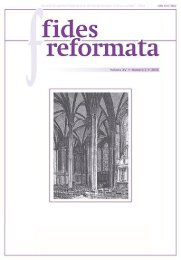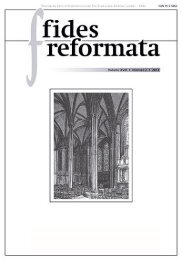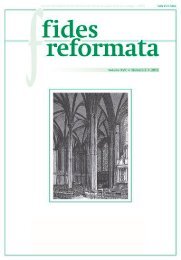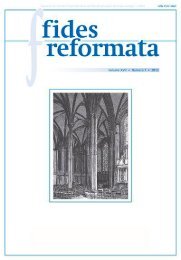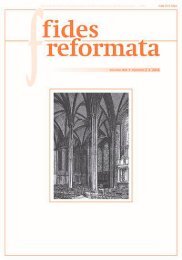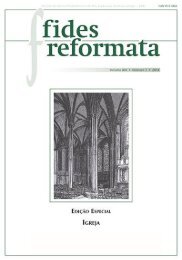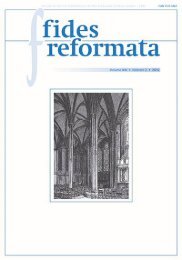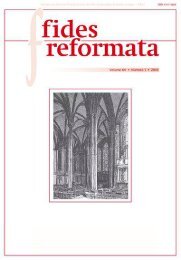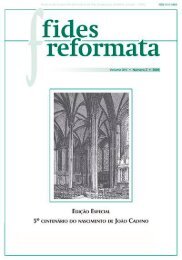Create successful ePaper yourself
Turn your PDF publications into a flip-book with our unique Google optimized e-Paper software.
FIDES REFORMATA XX, Nº 1 (<strong>20</strong>15): 89-105<br />
privilege in any sort of way; it is the fruit only of God’s grace, an element<br />
which characterizes the covenantal dealing in all its administrations. 43<br />
In his commentaries on Genesis 17, Calvin thoroughly elaborates on<br />
some characteristics of this dispensation. He identifies in this chapter the<br />
presence of a summary of the divine covenant. Concerning the content of<br />
Abraham’s vision, he writes: “Now that word summarily contains this declaration,<br />
that God enters into covenant with Abram: it then unfolds the nature<br />
of the covenant itself, and finally puts to it the seal, with the accompanying<br />
attestations.” 44<br />
The first element of the nature of the covenant clearly observed in Calvin’s<br />
teaching is its mutuality. In paraphrasing God’s words to Abraham, he writes:<br />
“See how kindly I indulge thee: for I <strong>do</strong> not require integrity from thee simply<br />
on account of my authority, which I might justly <strong>do</strong>; but whereas I owe thee<br />
nothing, I condescend graciously to engage in a mutual covenant.” 45 Peter<br />
Lillback explains that “mutuality acknowledges that both parties of the covenant<br />
have responsibilities.” 46 God, in Genesis 17, obligates himself to bless<br />
Abraham by means of promises. Those promises are, nevertheless, gratuitous,<br />
not depending on Abraham’s merit, character, or efforts. In this sense of God’s<br />
grace, the covenant is unilateral; it is the fruit only of God’s condescension.<br />
But, as a contract, the covenant also establishes obligations for Abraham. God<br />
demands from him devotion, servitude, and commitment to the righteousness<br />
of God. In Calvin’s words, the patriarch’s responsibility in the covenant was<br />
that “Abraham should be upright.” 47<br />
A second element Calvin identifies in the Abrahamic covenant is that<br />
of conditionality. Lillback explains that “conditionality outlines the responsibilities<br />
that each as party has toward the other.” 48 Commenting on the words<br />
“walk before me” in Genesis 17:1, Calvin affirms Abraham’s responsibility:<br />
43 “He (God) designs to open his sacred mouth, that he may show to one, deceived by Satan’s<br />
wiles, the way of salvation. And it is wonderful, that a man, miserable and lost, should have the preference<br />
given to him, over so many holy worshippers of God, that the covenant of life should be placed in his<br />
possession; that the Church should be revived in him, and he himself constituted the father of all the<br />
faithful. But this is <strong>do</strong>ne designedly, in order that the manifestation of the grace of God might become<br />
the more conspicuous in his person.” Calvin, Commentaries on Genesis, 1:343.<br />
44 Ibid., 1:442.<br />
45 Ibid., 1:444.<br />
46 Peter A. Lillback, The Binding of God: Calvin’s Role in the Development of Covenant Theology<br />
(Grand Rapids, MI: Baker Academic, <strong>20</strong>01), 169.<br />
47 Calvin, Commentaries on Genesis, 1:444. For a complete exposition of Calvin’s understanding<br />
of the mutuality of the Abrahamic covenant, read in full his comments on verses 1 and 2 of his commentary<br />
on Genesis 17. For several other places in Calvin’s writings where the concept of mutuality is<br />
developed, see Lillback, The Binding of God, 166-168.<br />
48 Lillback, The Binding of God, 169.<br />
99





